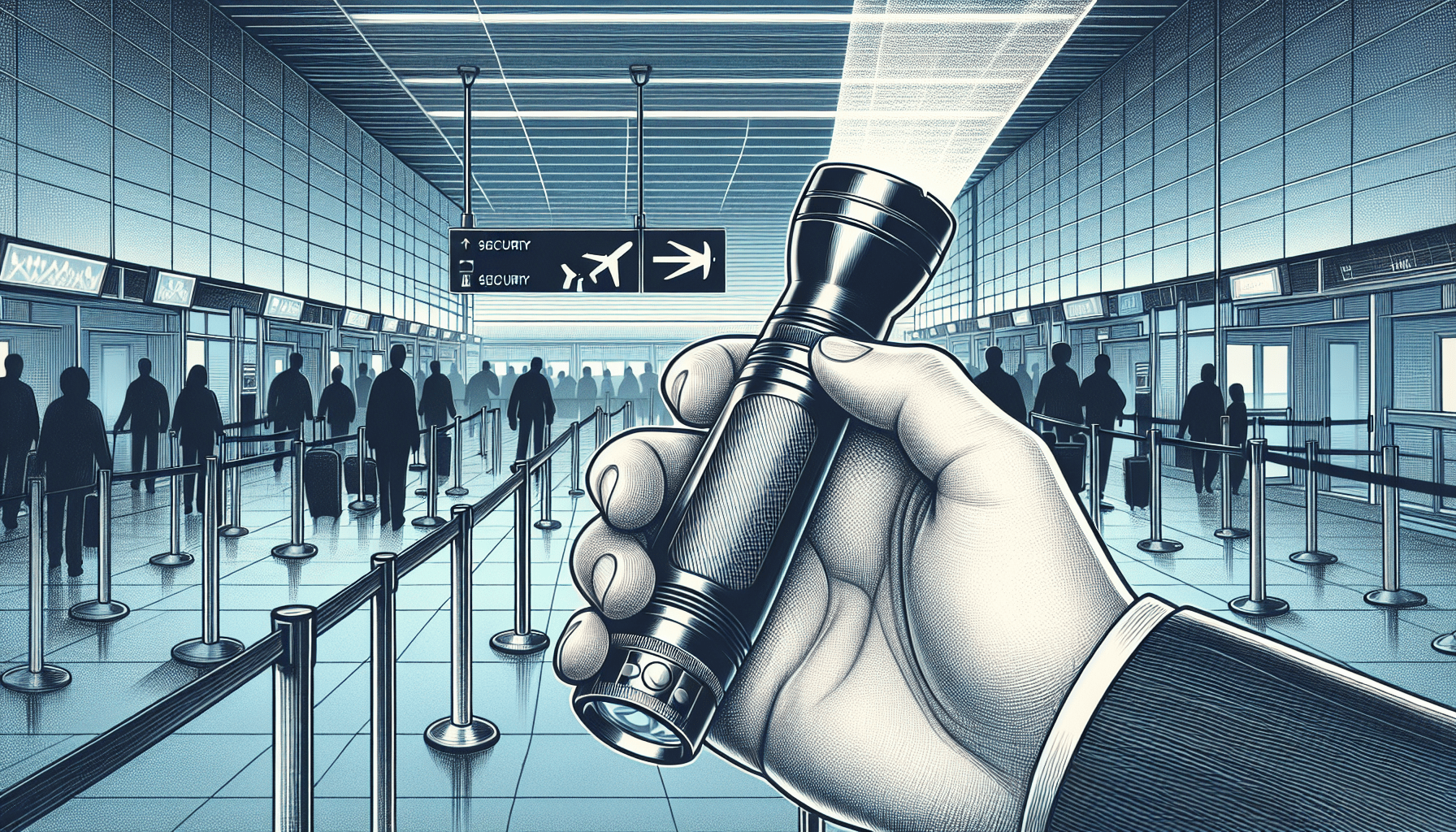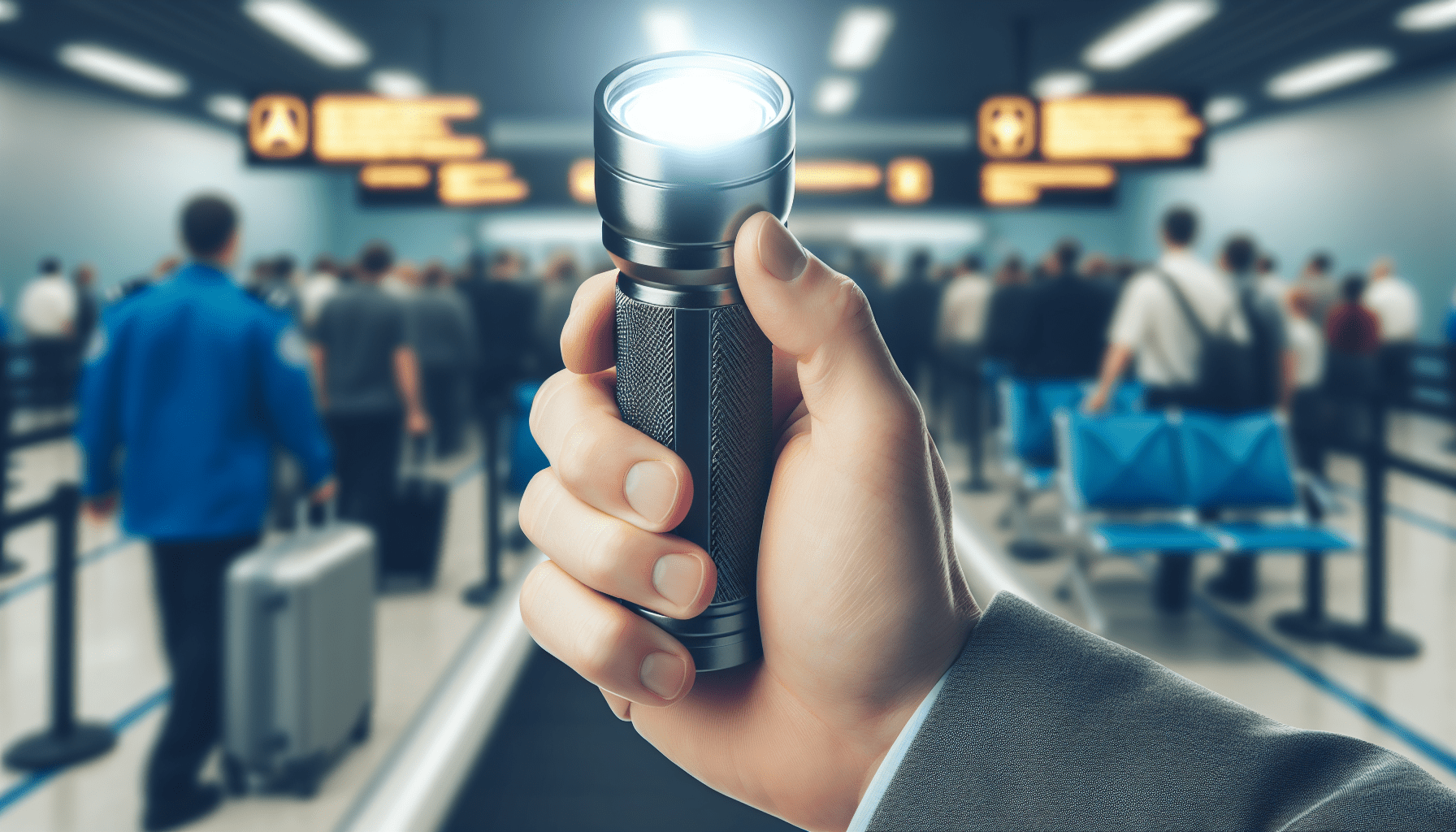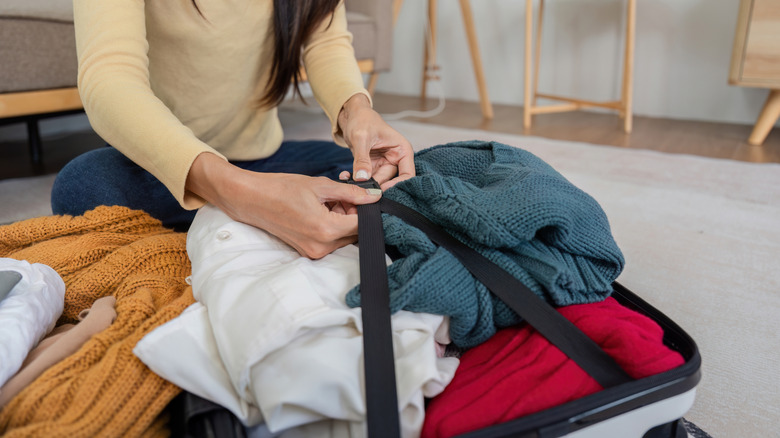BAGAIL 4 Set/6 Set/8 Set Compression Packing Cubes Travel Accessories Expandable Packing Organizers(Black ClothPattern 4 Set)
$19.99 (as of April 12, 2025 13:55 GMT +00:00 - More info)Navigating airport security with a flashlight doesn’t have to be a hassle if you know what to expect. In “TSA’s Important Guidelines To Bring A Flashlight Through Airport Security,” you’ll find everything you need to ensure your portable light source makes it safely through the TSA checkpoint. Whether you’re off on a camping trip or a distant hiking adventure, understanding the regulations for both the flashlight and its batteries can save you a lot of trouble. From size limitations to special rules for lithium batteries and the dos and don’ts of laser pointers, this guide has got you covered for a smooth, well-lit journey. Have you ever wondered if you can bring a flashlight through airport security? Whether you’re jetting off on a tent camping adventure or embarking on a hiking excursion to a remote locale, a trusty flashlight can be a handy companion on your journey. Given this, understanding the guidelines set by the Transportation Security Administration (TSA) is crucial to ensure your travel experience remains hassle-free.
Flying with flashlights primarily revolves around following TSA’s specific rules and avoiding any potential issues at security checkpoints. Let’s decode the important guidelines you need to follow to bring a flashlight on a plane, from size restrictions to battery-related rules.

Shop These Accessories for a Comfortable Trip
General TSA Guidelines for Flashlights
Navigating TSA guidelines can sometimes feel like a maze, but it becomes simpler once you know the key points. Flashlights are permitted in both carry-on and checked luggage, but there are several restrictions to be aware of.
Flashlight Length
Not all flashlights are created equal, and when it comes to flying, size does matter. TSA specifies that flashlights shorter than 7 inches are generally permissible in carry-on bags. Larger flashlights could potentially be viewed as a weapon and might be confiscated at the security checkpoint.
- Flashlights under 7 inches: Allowed in carry-on bags
- Flashlights over 7 inches: Should be placed in checked luggage or left at home
Flashlight Features
Your flashlight shouldn’t be combined with self-defense mechanisms such as blades or strike bezels. The presence of such features will likely result in the flashlight being denied entry into the plane cabin.
- Flashlights with self-defense mechanisms: Not allowed in carry-on; must be in checked luggage
- Standard flashlights without extra features: Allowed in carry-on bags
Tactical Flashlights
Tactical flashlights, which are designed to be used as a weapon, are treated with even more scrutiny. These could pose a threat to other passengers’ safety and may not pass TSA security.
- Tactical flashlights: Often not allowed in carry-on; safer to place in checked luggage
Battery Rules: A Key Consideration
One major component of your flashlight is its battery, and the rules around batteries are strictly enforced by both TSA and the Federal Aviation Administration (FAA).
Lithium Batteries
Lithium batteries, whether lithium-ion or lithium-metal, must be stored in carry-on luggage. This rule helps mitigate the risk of the batteries overheating or short-circuiting, which could cause smoke or even explosions in the plane’s baggage hold.
- Lithium metal or ion batteries: Must be in carry-on bags
- Devices containing these batteries: Also recommended to be in carry-on bags
Remove and Store Separately
If your flashlight runs on lithium batteries and these batteries can be removed, it’s wiser to store them separately. Remove the batteries from the flashlight and keep them in a separate bag or pocket.
How to Store Batteries
When both flashlight and batteries are in your carry-on, follow these storage tips to avoid security issues:
- Separate bag or pocket: Store batteries separately from the flashlight
- Visibility at security: Remove the flashlight and batteries when going through security, placing them in conveyor belt bins

Shop These Accessories for a Comfortable Trip
Safety Precautions with Laser Pointers
Laser pointers might differ from flashlights, but TSA treats them with similar regulations. Just like with flashlights, both carry-on and checked luggage are permissible for laser pointers, contingent upon certain safety considerations.
Batteries in Laser Pointers
Much like flashlights, if your laser pointer uses lithium batteries, stow them in your carry-on bag. Ensure they are either removed or kept in the “off” position to prevent accidental activation.
- Lithium batteries in laser pointers: Keep in carry-on
- Off-position or batteries removed: To avoid accidental activation
Legal Considerations with Laser Pointers
It’s essential to understand the legalities regarding laser pointers. Pointing lasers at aircraft is federally prohibited and subject to severe penalties. Always avoid using laser pointers near airports, aircraft, or within the aircraft.
Important Notes:
- Pointing lasers at aircraft: Illegal and dangerous
- Using lasers to interfere with aviation: Federal crime with severe penalties
Additional Screenings
While TSA may clear laser pointers, know that some destinations or venues might have bans on them, such as during significant events like the Olympics. Sometimes, additional screening might be required to rule out any safety threat.
- Venues and destinations: May have specific bans
- Additional TSA screenings: Possible for laser pointers
Essential Packing Tips for a Hassle-Free Experience
To ensure smooth sailing through airport security, here are some pro tips for packing your flashlight and batteries.
Checklist for Packing Flashlights
Consider these handy tips and precautions when packing a flashlight for your flight:
- Size Matters: Ensure your flashlight is under 7 inches for carry-on.
- Safety First: Avoid packing flashlights combined with self-defense tools.
- Removal and Storage: Remove batteries and store them separately.
- Visibility: Make sure to place items where they are easily visible during security checks.
Managing Battery-Powered Devices
If you have multiple battery-powered devices, here’s how you can manage them effectively:
- Separate Compartments: Use different compartments in your bag for various devices.
- Label Batteries: Label spare batteries separately to avoid confusion.
- Secure Placement: Ensure terminals or loose batteries are secured to prevent short-circuiting.
Recommended Storage Options
Packing smart can save you from unnecessary delays. Use specially designed storage cases for batteries and ensure your flashlight fits comfortably in your luggage.
Navigating TSA Security Checkpoints
Understanding how to streamline your time at the checkpoint is essential. Removing items and placing them in clear sight can speed up the process.
Step-by-Step Procedure
- Preparation: Before reaching the security conveyor, remove the flashlight and batteries from your carry-on.
- Placement: Place them in the security trays for easier inspection.
- Communication: Inform TSA agents if you have any critical items or if something requires special handling.
Common Mistakes to Avoid
Remember, a bit of preparation goes a long way. Avoid these common mistakes:
- Packing large flashlights in carry-on: Stick to under 7 inches.
- Forgetting to remove batteries: Keep them separate and visible.
- Carrying tactical flashlights: Opt for standard flashlights to avoid complications.
Commonly Asked Questions
Bringing flashlights and similar devices through airport security can raise a few questions. Let’s address some of the frequently asked ones.
Can I bring multiple flashlights?
Yes, you can. However, make sure each flashlight complies with TSA guidelines, particularly those concerning size and self-defense modifications.
What about other battery types?
While lithium batteries are commonly restricted to carry-ons, other battery types like alkaline or NiMH may have fewer restrictions. But always check specific airline guidelines.
Are rechargeable flashlights treated differently?
Most rechargeable flashlights use lithium-ion batteries, which mean the same rules apply. However, ensure the batteries are separate or the flashlight is in the “off” position.
Is there a limit to the number of batteries I can carry?
You’re typically allowed to carry spare batteries, but they must be for personal use. Airlines may have specific restrictions, so always double-check.
Real-Life Stories: Lessons from Fellow Travelers
Nothing beats learning from the experiences of others. Here are some true tales from travelers about dealing with TSA and flashlights.
The Camping Enthusiast
One traveler shared how they almost lost their favorite flashlight at a checkpoint. It turned out to be just over 7 inches, making it essential to measure beforehand. They learned the hard way but want others to avoid similar mistakes.
The Hi-Tech Hiker
Another traveler, more tech-savvy, decided to carry multiple devices with various battery types. Their advice? “Always separate devices and batteries, and never assume a TSA agent knows what your gadget is. Explain when necessary.”
The Family Vacationer
A family on vacation tried to pack their child’s novelty flashlight with built-in games and gadgets. Immediate advice: Ensure child-related devices still follow standard TSA guidelines.
Conclusion: Wrapping Up Your Flashlight Packing Checklist
Flying with a flashlight doesn’t have to be an ordeal if you know the rules. From ensuring the correct length and avoiding self-defense modifications to handling batteries with care, you can streamline your packing process and sail through TSA security without a hitch.
Recap Checklist
- Flashlight Size: Under 7 inches for carry-on.
- Battery Rules: Lithium batteries in carry-on only.
- Self-Defense Features: Not allowed in carry-on if combined.
- Visibility: Remove and clearly display items during security check.
- Additional Rules: Be aware of destination-specific bans.
By following TSA’s guidelines every step of the way, you’ll be that much closer to making your travel journey smoother and more enjoyable. So, next time you pack your bags, remember these tips and breeze through airport security with your trusty flashlight in tow! Safe travels!
Shop These Accessories for a Comfortable Trip





